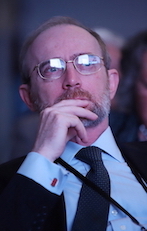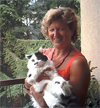Studying at the University of Verona
Here you can find information on the organisational aspects of the Programme, lecture timetables, learning activities and useful contact details for your time at the University, from enrolment to graduation.
Academic calendar
The academic calendar shows the deadlines and scheduled events that are relevant to students, teaching and technical-administrative staff of the University. Public holidays and University closures are also indicated. The academic year normally begins on 1 October each year and ends on 30 September of the following year.
Course calendar
The Academic Calendar sets out the degree programme lecture and exam timetables, as well as the relevant university closure dates..
| Period | From | To |
|---|---|---|
| Sem. 1A | Sep 24, 2018 | Nov 10, 2018 |
| Sem. 1B | Nov 19, 2018 | Jan 12, 2019 |
| Sem. 2A | Feb 18, 2019 | Mar 30, 2019 |
| Sem. 2B | Apr 8, 2019 | Jun 1, 2019 |
| Session | From | To |
|---|---|---|
| Sessione Invernale | Jan 14, 2019 | Feb 16, 2019 |
| Sessione Estiva (Gli esami sono sospesi durante la Sessione di laurea) | Jun 3, 2019 | Jul 27, 2019 |
| Sessione Autunnale | Aug 26, 2019 | Sep 21, 2019 |
| Session | From | To |
|---|---|---|
| Sessione Estiva | Jul 8, 2019 | Jul 13, 2019 |
| Sessione Autunnale | Nov 4, 2019 | Nov 9, 2019 |
| Sessione Invernale | Mar 30, 2020 | Apr 4, 2020 |
| Period | From | To |
|---|---|---|
| Festa di Ognissanti | Nov 1, 2018 | Nov 1, 2018 |
| Festa dell’Immacolata | Dec 8, 2018 | Dec 8, 2018 |
| Vacanze di Natale | Dec 22, 2018 | Jan 6, 2019 |
| Vacanze di Pasqua | Apr 19, 2019 | Apr 23, 2019 |
| Festa della liberazione | Apr 25, 2019 | Apr 25, 2019 |
| Festa del lavoro | May 1, 2019 | May 1, 2019 |
| Festa del Santo Patrono - S. Zeno | May 21, 2019 | May 21, 2019 |
| Festa della Repubblica | Jun 2, 2019 | Jun 2, 2019 |
| Vacanze Estive | Aug 12, 2019 | Aug 17, 2019 |
Exam calendar
Exam dates and rounds are managed by the relevant Humanistic Studies Teaching and Student Services Unit.
To view all the exam sessions available, please use the Exam dashboard on ESSE3.
If you forgot your login details or have problems logging in, please contact the relevant IT HelpDesk, or check the login details recovery web page.
Should you have any doubts or questions, please check the Enrollment FAQs
Academic staff
 claudia.annechini@univr.it
claudia.annechini@univr.it
 linda.napolitano@univr.it
linda.napolitano@univr.it

Pozzo Riccardo
 riccardo.pozzo@univr.it
riccardo.pozzo@univr.it
 +390458028053
+390458028053
 nicola.righetti@univie.ac.at
nicola.righetti@univie.ac.at
Study Plan
The Study Plan includes all modules, teaching and learning activities that each student will need to undertake during their time at the University.
Please select your Study Plan based on your enrollment year.
2° Year activated in the A.Y. 2019/2020
| Modules | Credits | TAF | SSD |
|---|
| Modules | Credits | TAF | SSD |
|---|
| Modules | Credits | TAF | SSD |
|---|
Legend | Type of training activity (TTA)
TAF (Type of Educational Activity) All courses and activities are classified into different types of educational activities, indicated by a letter.
Phenomenology and ontology of care - TEORIE DELL'ESPERIENZA AFFETTIVA (2018/2019)
Teaching code
4S007330
Teacher
Credits
6
Language
Italian
Scientific Disciplinary Sector (SSD)
M-FIL/01 - THEORETICAL PHILOSOPHY
Period
Sem. 1A dal Sep 24, 2018 al Nov 10, 2018.
To show the organization of the course that includes this module, follow this link: Course organization
Learning outcomes
The course aims at giving the conceptual, methodological and cultural grounds to promote a phenomenological inquiry on the affective experience and on the importance of emotional sharing for the relations of care, the individual formation (Bildung) and the foundation of social ontology.
In this course, crucial importance will be given to the role that desire plays in the relations of care and in the process of the human formation.
At the end of the course, students will have to prove: their adequate knowledge of the texts; critical assessment; to know how to communicate their knowledge in a clear, coherent and well-supported way; to know how to interact in the discussions with the professor and the other students.
Program
Inter-affectivity and inter-corporeality
Between 1909 and 1916 Max Scheler rewrote Kant’s transcendental aesthetics by means of Jakob von Uexküll’s biosemiotics and founded a new phenomenology of corporeity.
In this course we will deal with the foundations of the phenomenology of corporeity starting from Jacob von Uexküll’s thesis on the relationship between organism and environment and from Max Scheler’s theory of direct perception of expressiveness (Ausdruck). Both issues are at the center of today’s phenomenological debate on the theory of primary intersubjectivity of Trevarthen and of the inter-corporeality of Merleau-Ponty (Gallagher, Zahavi, Fuchs).
In particular, we will try to reconstruct the origin of the phenomenological distinction between a lived body (Leib) and an object body (Körper) starting from the writings of Scheler published between 1912 and 1913 (with advance therefore on Husserl, who will publish Ideas II only later). A special attention will be paid to the second part of Formalismus (1916), which has been increasingly recognized as one of the major philosophical works of the twentieth century. This allows us to overcome the predominant understanding of the phenomenology of corporeity, focusing on the problem of expressive unity and emotional sharing.
| Author | Title | Publishing house | Year | ISBN | Notes |
|---|---|---|---|---|---|
| Jacob von Uexküll | Ambienti animali e ambienti umani | Quodlibet | 2010 | ||
| G. Cusinato | Biosemiotica e psicopatologia dell'ordo amoris. In dialogo con Max Scheler | FrancoAngeli | 2018 | ||
| M. Scheler | Il valore della vita emotiva | Guerini | 1999 | ||
| Gallagher, Zahavi | La mente fenomenologica | Cortina | 2009 | ||
| M. Scheler | Scritti fenomenologici |
Examination Methods
For attending students:
A personalized program will be set together at the beginning of the course.
For non-attending students:
The exam is in oral form and aims at verifying the adequate knowledge of the scheduled texts. In order to access the oral examination, students must submit a paper of 20000 characters. The paper must be previously agreed on with the professor during his office hours – after students have read the texts – and is to be submitted at least 7 days before the exam. The paper must be submitted via email, with a .doc document containing the student’s name, surname and identification number.
Type D and Type F activities
Modules not yet included
Career prospects
Module/Programme news
News for students
There you will find information, resources and services useful during your time at the University (Student’s exam record, your study plan on ESSE3, Distance Learning courses, university email account, office forms, administrative procedures, etc.). You can log into MyUnivr with your GIA login details: only in this way will you be able to receive notification of all the notices from your teachers and your secretariat via email and soon also via the Univr app.
Competenze linguistiche
I crediti formativi universitari relativi alle "Ulteriori competenze linguistiche" (B1 informatizzato se seconda lingua; livello B2 completo se stessa lingua della triennale) possono essere acquisiti in una delle due seguenti modalità:
- iscrizione da parte della/o studente presso il Centro Linguistico di Ateneo (CLA ➔ https://cla.univr.it/it/test-e-certificazioni) per il sostenimento e il superamento delle prove + iscrizione, sempre da parte della/o studente, in apposita lista per la registrazione crediti e registrazione CFU (senza presenza) da parte dell’Università.
Oppure
- equipollenza di certificazioni linguistiche esterne: riconoscimento equipollenza di certificazioni linguistiche esterne (➔ https://cla.univr.it/it/servizi/riconoscimento-delle-certificazioni-linguistiche-esterne).
Gestione carriere
Linguistic training CLA
Internships
Graduation
Documents
| Title | Info File |
|---|---|
|
|
pdf, it, 99 KB, 13/10/23 |
|
|
pdf, it, 101 KB, 10/04/24 |
List of theses and work experience proposals
| theses proposals | Research area |
|---|---|
| Linguaggio e mito in Tolkien | ENGLISH LITERATURE - Critical Theory & Poetics |
| Dialettica del negativo in Meister Eckhart | HISTORY OF PHILOSOPHY - MIDDLE AGES |
| La felicità nel Medioevo | HISTORY OF PHILOSOPHY - MIDDLE AGES |
| Le figure di Eva e Maria in Ildegarda di Bingen | HISTORY OF PHILOSOPHY - MIDDLE AGES |
| IA. Una critica fenomenologica al concetto di Intelligenza Artificiale | The Human Mind and Its Complexity: Cognitive science, psychology, linguistics, philosophy of mind - Philosophy of science, epistemology and logic |
Practical information for students
Documents
| Title | Info File |
|---|---|
|
|
pdf, it, 325 KB, 02/05/23 |
|
|
pdf, it, 212 KB, 02/05/23 |
|
|
pdf, it, 131 KB, 02/05/23 |





















